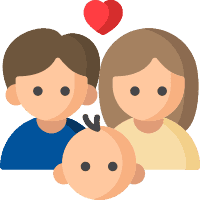As a parent, it can be scary when your child isn’t reaching expected speech and communication milestones. Perhaps your daughter is making grunts instead of using words or maybe your son isn’t making eye contact or talking at all. Often, then, an official diagnosis of autism spectrum disorder (ASD) can come as a relief to parents. Then you will have a diagnosis and can seek appropriate treatment such as Speech therapy for autistic children.
Speech-language therapy can address many communication-related challenges children with autism might encounter. These benefits can last for years and make profound improvements in quality of life as kids age, especially when they are started early.
What Is Autism and How Does it Impact Speech?
The most obvious signs of autism typically present between the ages of 2-3, so most people with ASD are diagnosed in early childhood. However, autism can generate a wide range of symptoms of variable severity. In some cases, then, autism can be difficult to notice.
In other cases, it might be hard to miss.
While speech is typically not the only area of behavior impacted by autism, it can be one of the most noticeable. Autism in young kids may present at varying levels in the following ways:
- An avoidance of speaking altogether.
- The use of cries, grunts, shrieks, or other sounds to communicate.
- The use of word-like sounds.
- Heavy use of echolalia, which is the tendency to repeat what other people say.
- An expressionless or robotic style of expression, even if the words used tend to be the correct ones.
As the kiddo grows, you may notice difficulty with communication more broadly. For example, a child with autism may have trouble picking up on nonverbal communication cues or making eye contact. Some youth with autism also have a hard time picking up on creative uses of language, such as metaphors. It should be noted, again, that these presentations do vary in both frequency and severity. Many people with autism, for example, may present with only one or two symptoms.
Benefits of Speech Therapy
Communication challenges can make it more difficult for children with autism spectrum disorder to navigate common social situations. As a result, many parents see significant benefits in using speech therapy to help kids with autism improve their social and communication skills. Speech therapy pathologists have experience working specifically with issues created by autism spectrum disorder.
Some of the most tangible benefits of Speech therapy for autistic children include the following:
- An improved ability to parse and understand nonverbal communication cues. This can make navigating conversations and social situations much more manageable (and much less stressful).
- Increased aptitude for initiating conversations without prompting. Additionally, kids with autism who have experience with speech therapy are often better able to read social cues when selecting topics of conversation.
- A better grasp of articulation, allowing kids to enunciate their words with significantly more clarity.
- Improved understanding when it comes to contextualizing language, so kids know when to say, for example, “Good night” vs “good-bye.”
- Progress in competencies surrounding socialization with peers; your child will likely find it easier to play and make friends with other kids their age.
Speech therapy for autistic children benefits often result in less social friction and a more robust ability to build stronger and better relationships over time. For parents, that can be a significant relief.
It’s also important to point out that the benefits of speech therapy for children with autism are amplified by starting therapies as early as possible. Generally speaking, the sooner speech therapy can begin, the more pronounced the positive impacts will be over the course of your kiddo’s life.
What to Expect From Your Speech Therapy
Pediatric speech-language pathologists will use a wide variety of techniques and therapies to help your child with autism develop new and important communication and speech skills. Some of the most common therapies include:
- Exploring alternative communication methods, such as singing or typing. In some instances, therapies may include Picture Exchange Communication Systems, where kids try to express themselves using pictures instead of words.
- Focusing on speech articulation using specialized tools or performing tongue exercises. This technique focuses on getting kids used to making the mouth shapes and tongue movements necessary to enunciate words clearly.
- Practice with social communication. Therapies may emphasize unwritten rules of communication, such as how and when to take turns. In other cases, this practice could focus on transitioning from one topic to another.
Your speech therapist will work with you to develop a customized treatment plan for your child’s needs. It’s important, after all, to emphasize that every individual will indeed have unique needs. Kids with autism are not a monolith, so speech therapy for children with autism can be tailored and customized to address challenges and emphasize strengths in every kid.
Autism Requires a Diagnosis
It’s important to point out that, typically, autism spectrum disorder requires a medical diagnosis–it’s not something you can assess from home by searching the internet. But if you think your child is having difficulty with language, they can always be evaluated by a pediatric speech-language pathologist. We’ll develop a unique and customized speech therapy plan for your kiddo based on their needs.
And if you already know that your child has autism, we can develop a plan based on that diagnosis. If you have questions about speech therapy for children with autism, schedule a 15 minute chat during our free office hours or contact our offices to set up a consultation with our speech therapist.


